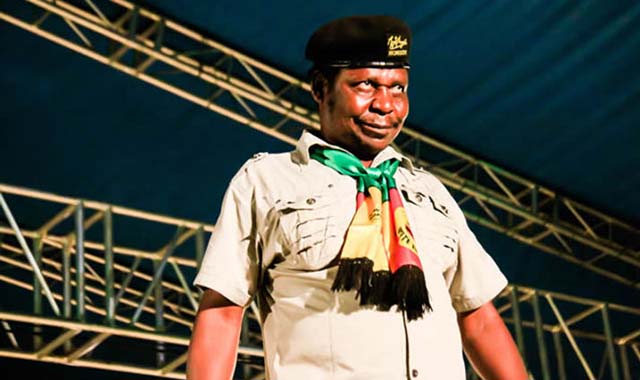Defending our country, nationhood


Cde Chinx. . . “Roger confirm, we’re feeling the same; Over”
David Mungoshi Shelling the Nuts
Last week we went down memory lane along boxing roads. We looked in on approved rings but did not rough it up on dusty spots in Chivhu town, where peasants waiting for a bus could try their luck in a ring where weight divisions were unheard of.
In the background would be the booming drum of Chekaimwenje the muchongoyo dancer who danced around the country during the holidays to raise school fees for his children. In Harare they had “Wafa wafa” (One who dies is dead). If you died in any of these rings it was considered an occupational hazard.
This week we want to try something different and for someone outside the boxing ring. This week we go on stage. To do that we can leave the boxing ring with a flourish and do an impromptu rhyme:
Charles “Shocker” Manyuchi// Yeah// Bigger than Gucci// Yeah
Soul Jah Love, how about you develop this further so that we don’t spend all year going “Ngumbu ngumbu”? You detest that kind of mediocrity and I fully agree with you on that.
Reader, you’re probably wondering why I keep waxing lyrical about boxing and about Manyuchi. The answer is simple. Boxers were like folk heroes when I was a boy. My father was a boxing enthusiast and a pundit.
He was a founder member of the Mazezuru Boxing Club which later paved way for the Matabeleland African Amateur Boxing Association. Highlanders FC was known as Matabeleland Highlanders and Zimbabwe Saints was Mashonaland FC.
We were big on tribe and region then. My fear is that we may not have outgrown that phase. But I think I have, for now, paid enough homage to the boxing ring and we can move on.
Social media can be notorious and infamous, and WhatsApp chat groups are sometimes no more than just a forum for people to post adventurous selfies. Most girly selfies are of a female with pouting lips. She makes you think she will kiss just about anybody. Amateur writers also make all sorts of wild claims about everything on these sites.
Happily, that is not always the case. There are times when people post things of import. The other day a member of a chat group that I subscribe to posted a picture of Bob Marley accompanied by the words:
Some people are so poor// All they have is money
You want it darker than that? No doubt there will be those who are so much into trinkets and trappings that the import of Marley’s words is lost upon them. In one interview, a journalist asks Bob Marley if he’s rich, if he’s got a lot of money, if he’s got millions of dollars. Marley’s enigmatic response is, “Money make me rich?”
There are some among us who think that money is everything. This is what fuels the corruption that we are all crying about. Even those of us who are corrupt will keep up appearances and sing this same song about corruption.
One day I was waiting for something to carry me from Mutoko growth point to Harare. It was a hot day and so I made my way to the kiosk nearby and bought myself a cold fizzy.
As I refreshed myself with a predictable brand of soda as the Americans would say, I saw a group of tired-looking but hardy Somalis walking all the way from their homeland through the Zimbabwe to South Africa.
One of them came over to the kiosk and just sort of sniffed around as if that would make the hunger go away. I had heard that Somalis share even the smallest bit of something, from a grain of maize to a bit of water.
The sorry sight of this particular group reminded me of Thomas Mapfumo’s song “Varombo kuvarombo” where he says when hunger and famine strike, they should affect us all equally.
The ethos in Mapfumo’s song is probably motivated by freedom fighters during Zimbabwe’s armed struggle. Is it any wonder then that Comrade Chinx sings quite a lot about “the good of all”?
For decades he has given us songs whose epigrammatic lines and catchy melodies to make him one of Zimbabwe’s top musicians. His music unfailingly raises pertinent questions around the notion of nationhood. In an interview at the Harare Gardens many years ago and after a well-received performance, Comrade Chinx explained his music this way:
“This music you know; it’s a transition, right? From liberation music up to the music for development and reconciliation. At the present moment we have got this unity; we want it so much, and we’ll have to develop our country, and to develop our country we must be reconciled fully, and all my music should touch on these lines.
“And the way I do it is. . . I’ll have to say where the bad is, and right, say where the good is, right? To the truth of the good is where everyone should look to. So I shun the bad and always promote the good.”
Thirty-six years after independence, Comrade Chinx’s words are a clear musical manifesto by which we can measure ourselves at all levels. What progress have we made as a nation, or failed to make? We can also ask other obvious, but important questions: Has liberation been attained? If liberation has been achieved, what about development?
We valued unity once. Is this still the case? Zimbabwe was the first among newly-independent African states to openly espouse reconciliation as a national policy. Has this been achieved? Has Comrade Chinx said where the bad is and where the good is?
In the danceable song “Zvikomborero” the delightful chorus (Yeah, yeah, yeah, Zvikomborero/Kubatana- To be united is to be blessed) is irresistible and transforms the song into a happy sing along one.
Paradoxically, the song’s lyrics make it a no-holds-barred song with Chinx castigating disunity, selfishness, frivolousness and demagoguery. By contrast, he extols the virtues of unity of purpose and common visions.
Dear readers, I fear that we seem to have lost a little something along the way and must somehow rediscover it and forge ahead together as one with a common vision and unity of purpose.
Our New Year resolutions could capture these sentiments. Some introspection is necessary. Typically, Chinx foresaw this when he did “Roger Confirm” that delectable reggae song of his.
Singing about reconciliation among several other things, in “Roger Confirm Chinx” sings:
The shining word of our time// Reconciliation// Enemies become friends// Realising praxis
In the same song Chinx also sings:
“Roger confirm// we proceed to the same loco. . .”
Chinx wonders if our objectives are still the same and if we have not veered off the chosen path. Events in recent years would seem to suggest that we have not, as a nation and as a people, kept strictly to the essentials of our script. This is not to say there is nothing to applaud. On the contrary, there are a few distinctive things to celebrate.
No one would dispute the fact that as a country we have had our fair share of droughts and famine, and yet we survived all that without too much assistance from outside. We have somehow managed to escape those depressing pictures of famished skeletons of human beings waiting to cross over.
And we did all that by being creative and enterprising. Do you remember the drought relief fund? Those of us in gainful employment had our salaries and wages levied in order to create funds that were then used to buy maize from outside. This innovation came together with the phenomenon of “food for work”.
Zimbabwe’s education has paid dividends to the extent that the country’s literacy rate is generally regarded as the highest on the continent. The percentage of people who can read and write in this country is higher than anywhere else.
This is probably due to a very large measure to the free primary education that was put in place in the first ten years of independence. In those years, education with production was the buzz word. This is the praxis that Chinx sings about in “Roger Confirm’.
A simple definition of praxis should help us explain what it is we are talking about. Simply put, praxis is about walking the talk and doing the things we have always said we would do in the way that we have always espoused. We shouldn’t talk endlessly like empty chatterboxes.
Zimbabwe, how are we doing as individuals and families, as communities, organisations and as a nation? As football teams even! Why, after 90 years, is Highlanders still not a huge brand in terms of a stadium, an academy, finances and programmes? We can ask the same of Dynamos with its mythical seven-million support base? Are we all going the same way?
As Chinx says, “Roger confirm, we’re feeling the same; Over.”
David Mungoshi is an applied linguist, poet, short story writer and award-winning novelist.









Comments